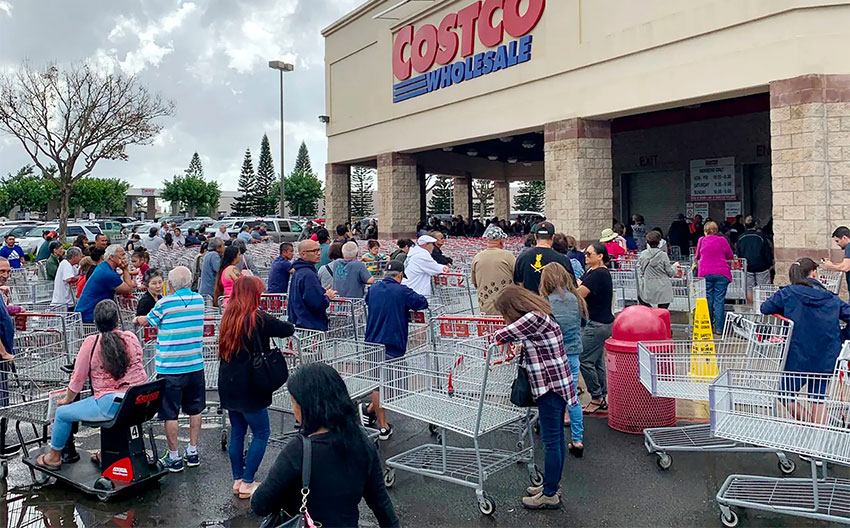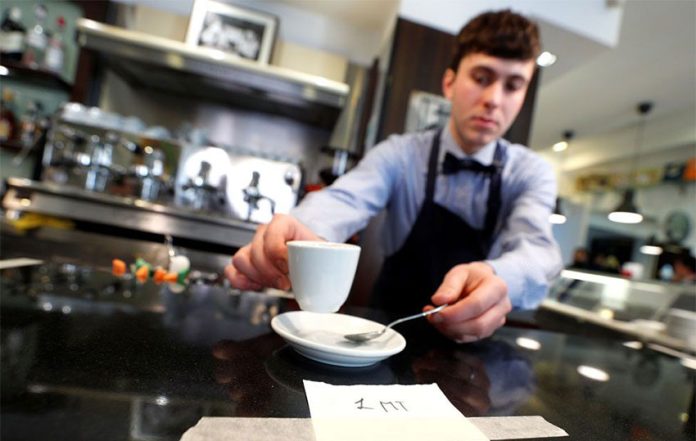Today the World Health Organization (WHO) declared the coronavirus a pandemic, adding that it is concerned both by “the alarming levels of spread, and the alarming levels of inaction.”
What does this mean to expats living in Mexico, or snowbirds preparing to go back home? The full scope of Mexico’s response remains to be seen, but right now we can all individually prepare for the likelihood of restrictions on travel and gatherings or of advised self-quarantines.
Whether or not the coronavirus has affected the community where you live remains to be seen, as Mexico’s testing and containment efforts seem to be limited to the immediate people connected to the eight confirmed cases. Besides stringent hand-washing after being out in public and not touching your face, every one of us can help prevent its spread and protect ourselves by practicing what the WHO calls “social distancing.”
That means more than trying to keep a 2-meter distance between yourself and others while out in public – it also means avoiding crowds whenever possible. Dozens of sports, music and political events have been cancelled in the U.S., Canada, Europe and South America; schools and colleges are cancelling in-person classes and scrambling to retrain professors to work online; nursing homes are closing their doors to all but urgent visits from the outside.
Experts say Covid-19, like any virus, will spike before it plateaus, and we haven’t seen that – yet – here in Mexico. And with Semana Santa (Holy Week) coming up – a time when thousands of people travel around the country – the likelihood of the coronavirus spreading is almost guaranteed.
On Monday, the U.S. Centers for Disease Control recommended that “people with underlying conditions or who are over 60 stock up on medications, household items and groceries to stay at home ‘for a period of time.’”
What is Mexico doing? That remains to be seen. Where I live in Mazatlán it seems to be business as usual. In fact, as I write this, I can see two just-arrived cruise ships docking. The official government position is that there are eight confirmed cases in the country and the virus is “contained,” with no community spread. (Why this would be the only country in the world where that is happening makes no sense.)
At any rate, I’m not here to criticize, only to pass on suggestions from WHO as to what regular citizens everywhere can do to help stop the spread of the virus.
One of those things is to practice responsible social distancing by minimizing the trips we make to the grocery store or mercado over the next few weeks. When you do go shopping, go early in the morning when stores first open to encounter the least number of people. It’s also not a bad idea to stop using that credit card everywhere; get cash and pay with exact change as much as possible just to avoid the back-and-forth.
Keep some disinfectant wipes in the car for the grocery cart handle, those credit cards, your hands and even the ATM. Hmm, maybe the person before you just sneezed all over the machine. How long can the virus live outside the body? Here’s what the WHO says:
“It’s not certain how long the virus that causes Covid-19 survives on surfaces, but it seems to behave like other coronaviruses. Studies suggest that coronaviruses (including preliminary information on the Covid-19 virus) may persist on surfaces for a few hours or up to several days. This may vary under different conditions (e.g. type of surface, temperature or humidity of the environment).”

Before you go to the store, make a careful list so you can shop strategically. Only buy things you and your family will actually eat. Should you be quarantined for two weeks and couldn’t leave your house, what would you want to eat, and what meals would be possible to prepare? Think of this shopping trip as your usual meal prepping, but with some limitations.
This is not meant to incite panic – only to counsel preparation and prudence as we head into this unknown territory.
Water
Have your own filtration system? You’re set. Those of us who buy garrafones of water would be wise to buy some extras. As a single person, I have five bottles I keep filled.
Medicines
Recommendations call for a 30-day supply of medications; while you’re at it, stock up on basic first-aid supplies too. (Tip: On Mondays, Farmacias Similares has a 25% discount on everything.) And it’s never a bad idea to have vitamin C on hand to help strengthen your immune system.
Pets
Buy your furry or feathered friends whatever canned or dry food – or medicines — they’ll need.
Paper goods and cleaning supplies
Those photos of people stocking up on toilet paper at Costco in the US notwithstanding, this is a product we use every day. Or several times a day. (Ahem.) It can’t hurt to have enough tp, paper towels, laundry soap and other cleaning supplies, but no need to go overboard.
Canned and packaged foods
This is obvious. Buy all your favorites: tomatoes, beans, sauces, tuna or other fish, broths, soups and chile, salsas, peanut or other nut butters, coconut milk (finally make that Thai curry!), shelf-stable tofu, pasta, popcorn, snacks (chips, crackers, nuts), cereals, dried beans, rice. Don’t forget sweets: cookies, candy, whatever it is you turn to for comfort. Electrolytes or sports drinks (I use the small packets of powder available at farmacias to make my own). Like to bake? Stock up on flours, sugars, nuts and such.
Meats
Smoked and cured meats – think bacon, ham, lunch meat – will keep almost indefinitely in the fridge.
Dairy
Shelf-stable milk lasts about two months. Most hard cheeses can be frozen although they’ll be more crumbly when thawed. Butter and margarine both freeze well.
More information and daily updates on Covid-19 can be found on the World Health Organization website.
Mexico News Daily
